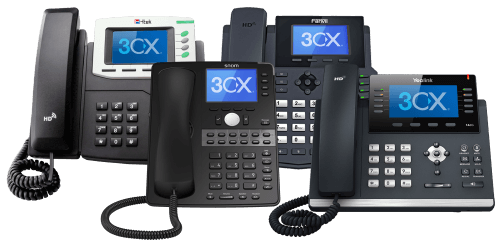There are not many businesses that could not benefit from having an on-premise business phone system, however, first, it is important to understand what a PBX is and decide whether this phone system is right for your office phone set up.
PBX stands for Private Branch Exchange, (sometimes also called On-Premise IP PBX). This is a private telephone network that is used within a business or organisation. A big advantage of this solution is that any user of the PBX phone systems can communicate internally or externally. There are a range of different communication channels that can be used, such as SIP, analog, or ISDN. A PBX will also allow you to have more phones than a traditional phone line (PTSN) and it allows free calls between users. Other features like transferring calls, voicemail, call recording, call queues, information or music on hold, and interactive voice menus are also part of this business phone systems solution.
PBX phone systems are available as a hosted solution, virtual or on-premise solution.
The advantages of On-Premise PBX
There are many benefits of having on-premise PBX, and here are just a few examples to consider:
Low Cost
There are feature sets that are low cost. By contrast many hosted VoIP providers will have additional charges for some key telephony features. Multiple other options might see extra expenses, too, for example: A call queue is also likely to have an additional cost. In fact, you will likely see a price associated with call recording, wallboards or contact centre functions when you deploy a hosted VoIP system. However, if you are looking to lower costs across the board, then these features will typically be included in the premise-based PBX software.
Lower Running Costs
The last thing any business needs is to sign up for a service that looks great, only to be hit with high charges later down the line. If it will typically cost your business less to manage an on-premise PBX system and associated trunks, than it will to retain a hosted licence for each user running over time, then this is worth considering. Trunk concentration usage, along with diversity options, and the total number of users are key considerations when addressing this question.
You Own It
With all other phone systems, you very rarely own the equipment you are using. Instead, you will be paying a monthly fee to use the equipment that is hosted elsewhere in the cloud. However, if you prefer to own the hardware that you are using to keep your business running then an on-premise PBX is the ideal solution for you.
Choice of Platform
There is plenty of choice from a range of manufacturers with on-premise eg NEC, Panasonic, Unify, Avaya, & LG whereas many of the IP hosted solutions utilize the same underlying technology platform eg Broadsoft.
Internet
While all businesses suffer from poor internet connectivity at times, if you like the idea of having 100% reliability, then the on-premise PBX solution is a winner. We consider the internet to be reliable, robust, and the ideal solution for businesses. It only takes a few minutes of an outage to have a significant impact on your business productivity. Generally, internet providers offer a 99.9% internet uptime, but an on-premise PBX solution is even more reliable than that. When the internet has issues, it is not just the ability to communicate with customers that suffers, but internal communications also get affected – faxes, video conferencing, and voice will all grind to a halt. The most significant form of protection that you can give your business against potential disasters is investing in an on-premise PBX phone system, rather than considering a hosted alternative. So, when the internet goes down, you know that you can still conduct business as usual.
Customization
Most businesses have a reliable and experienced IT team. And if so, they will be qualified to deal with networking. They not only can manage your phone system, but they will have the capability to customise it too, e.g. integrate with Business management systems via API’s like a CRM. This will benefit your business in many ways. And, if your IT team is well versed in networking – it is the perfect time to provide training for them.
Features of an On-Premise PBX
There are some great functions that are on offer with an on-premise PBX system. The rich features can change how you do business internally and they can also give your staff higher efficiency, improved customer service, and flexibility.
These are some of the features:
- Remote connectivity: digital PBX systems allow usage from outside the office, on a connection through the internet. This means you can check your voicemails, and the call data or user no matter where you are.
- Voicemail to email: You can arrange your voicemails to be sent as an audio attachment on an email.
- Call routing: You can set-up the system so that callers can use a specific number that is routed to the right people and teams. Automatic call routing can redirect the right calls to the right people if the initial recipient isn’t available.
- Conference calls: Many users can be patched into a call at once.
- Hold options: You can play music or marketing messages to people who are on hold to reduce the chances that they will hang up.
- Call transferring: You can assign incoming and outgoing calls to anyone on the system with a couple of buttons. Modern digital PBX systems often have easy touch screen phone options too.
Hosted PBX vs Onsite PBX
The main difference between a hosted vs on-premise phone system is who owns and manages the phone system hardware and software. With on-premise PBX, you will own it, and you will need to maintain it, as well as manage the hardware. With hosted PBX, it is owned and managed by the provider and it will be hosted in the cloud and connect to your team over the internet.
Both on-premise and hosted IP voice phone systems are effective and reliable phone systems that offer different benefits. These systems are compatible with different types of businesses, depending on what each business expects of an office phone system. It is difficult to say whether one system or approach is better than the other. What is true is this: each system is better for specific office communications requirements based on your technology lifecycle, communication and ISP provider options, and existing contractual obligations. As a rule of thumb, when advanced unified communications features and complex integrations are required and you have a robust and reliable data network and infrastructure, the on-premise system is often best. Alternatively, companies with a mobile workforce, seasonal changes in call volume, a need for remote working, multiple locations or the desire to standardise your communication platform should consider adopting a hosted voice solution for their office business phone system
Both, of course, are worthy choices, but your needs and circumstances will dictate why you should favour one over the other.
The Pros and Cons of On-Premise PBX:
Lower running costs over time mean that on-premise PBX is the most cost-effective option for companies that like to keep a close eye on their bottom lines.
On-premise PBX is also much cheaper to scale than hosted PBX. With on-premise PBX, you will need to make an investment in the equipment, but with hosted PBX, you will need to make an investment in the licenses and hardware. This should be a serious consideration for businesses that are in a growth period.
In general, when you are looking for the highest level of reliability, robust business continuity options and features, along with unified communications systems, then an on-premise system is the ideal choice.
As with most things in the business world, choosing between on-premise and cloud-based solutions for office telephony will require careful consideration of key business needs and constraints, both for now and in the future. Engage with Juno Telecoms for a no-obligation review of the trade-offs in making this business-critical decision
What to Ask When Comparing Hosted PBX to a Traditional PBX?
When it comes to choosing between a hosted PBX and a traditional PBX it’s important to ask your chosen provider, such as ourselves some questions:
- What’s your budget?
- What are the estimated costs of installing a hosted PBX vs. a traditional PBX?
- Do you have a preference between capital expenditures (CAPEX) and operating expenditures (OPEX)?
- How much do you want to spend in the long-term?
- Does your IT team have the resources and skills to manage a business phone system?
- What’s your company’s projected growth?
- How will you handle redundancy and resiliency?
By exploring your businesses needs and requirements we can provide you with valuable insight when weighing the benefits and drawbacks of hosted VoIP, which helps you make an educated decision on which one you will incorporate into your company.
If you think moving to a hosted PBX may be more beneficial to your company, speak to one of the team members at Juno Telecoms. We have years of experience in PBX phone systems and we are happy to help you find a solution that is right for you.
Get in Touch with Us Today
If the above features and benefits sound like something worth taking advantage of, we at Juno Telecoms are here to help. We can guide you through the different options available, offering a zero-technical mumbo-jumbo analysis of which on-premise PBX system best fits your needs and the tradeoffs and benefits versus hosted VOIP solutions. Please contact us here.















